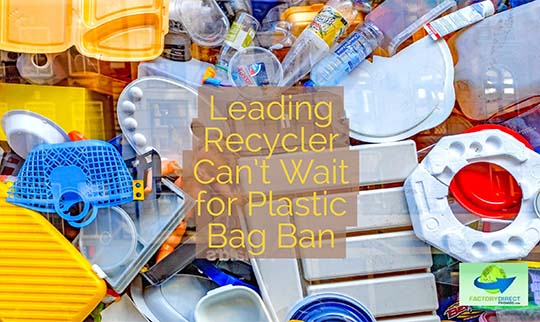Why The Leading Recycler in Boston LOVES Plastic Bag Bans

Plastic Bag Bans In Boston Can’t Come Soon Enough for This Recycler
We have mentioned numerous times on our blog how difficult, inefficient and expensive it is to recycle plastic bags. Now one of the biggest recycling companies in Boston is speaking out and throwing their support behind the plastic bag ban movement.
Single-use plastic bags are easy to recycle on their own, but the reality is these bags complicate the process and are not widely accepted in most recycling programs. When plastic bag bans go into action one business that benefits are recycling facilities. Learn more and find out just what sort of problems disposable plastic bags can cause in recycling facilities.
Plastic Bag Bans Improve Recycling Operations
Casella Waste is one of the largest recycling plants in the U.S. and their facility in Charlestown handles most of the recycling from Boston and the surrounding areas. Officials at the Charlestown facility have expressed their support for plastic bag bans, particularly the ban coming to Boston in December of this year.
Plastic bag bans phase out single-use plastic bags and, given time, that will translate into significantly fewer disposable plastic bags in the recycling stream. Without disposable plastic bags in the mix, recycling facilities will be able to operate more efficiently and keep up with the supply of materials coming in.
Bags Easily Become Stuck in Machinery
Single-use plastic bags, known in the recycling industry as Low-Density Polyethylene (LDPEs), are in fact recyclable. However, the process for handling plastic bags is different from handling other types of recyclable items. The thin film of disposable plastic bags can easily become stuck in equipment and in most instances will cause work to stop until the blockage is cleared. The hassle and inconvenience that come with recycling plastic bags cause many facilities to pass on accepting these bags.
Despite Best Efforts, Plastic Bags Wind Up in Recycling Bins
People still toss single-use plastic bags in recycling bins, even though they are not accepted, so some of these thin film bags still find their way to recycling facilities. When plastic bags are mixed in with other recyclables they are considered a contaminant that can jam the equipment and cause work to come to a standstill. At the Casella Waste Charleston location employees routinely spend time every day clearing disposable plastic bags from the equipment. When Boston’s bag ban goes into effect that will dramatically decrease the amount of time spent clearing blockages.
Difficulty Recycling
The entire situation is disappointing because if handled properly single-use plastic bags can be recycled. Most grocery stores accept plastic bags for recycling, but consumers simply do not take advantage of these programs. When existing plastic bags are not recycled new bags are manufactured to replace the bags that are thrown in the garbage or tossed in curbside recycling bins. This process continues to play out with new bags being manufactured and ending up at places like the Charleston recycling facility.
Benefits of Plastic Bag Bans
From improving the efficiency of recycling operations to reducing litter and making more efficient use of nonrenewable resources, plastic bag bans have a lot to offer. The effectiveness of plastic bag bans is not widely accepted. When plastic bag bans come up there is typically resistance from some officials and community members. In some cases, the issue goes to the state level, and while there are success stories there are other states that prefer to avoid the issue.
Learn more about the plastic bag ban movement and find out how reusable shopping bags can help your customers, your brand and the planet.
Tagged





Pingback: The State of Recycling